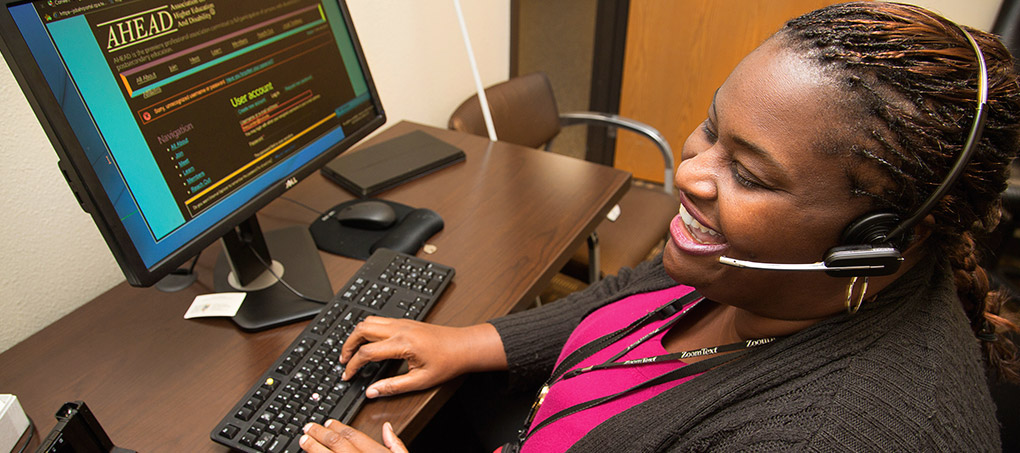Leveling the Playing Field
By Kendra Prince
For Tracy Jordan, district coordinator of assistive technology, life forever changed in 2003 with a bite from a brown recluse spider. Her leg swelled to three times its normal size and she endured seven amputations below the knee as her doctors tried to get ahead of the venom, which was irreparably destroying tissue.
What Jordan (pictured above) didn’t know at the time was that the anti-venom the doctors were administering was burning her retinas. One morning, she woke up unable to see. Although efforts were made to reattach her retinas, her vision could not be restored. Today, she is totally blind in one eye and can only distinguish between light and dark in the other.
Before the spider bite, Jordan owned a dog grooming business. Once she lost her sight, she turned to the Dallas Lighthouse for the Blind and the Department of Assistive Rehabilitative Services (DARS) for training. She earned her certification in assistive technology and also decided to go college. After completing her bachelor’s and master’s degrees, Jordan is now working on her doctorate in Public Policy and Political Economy, all at the University of Texas at Dallas. She also is considering pursuing a master’s degree in Assistive Technology offered through California State University Northridge.
“I bring knowledge and experience to the table,” said Jordan, who assists Tarrant County College students and staff with the technology they need to learn and work. She is the first at TCC to serve in this role.
According to the Assistive Technology Industry Association, assistive technology is “any item, piece of equipment, software or product system that is used to increase, maintain, or improve the functional capabilities of individuals with disabilities.” Jordan uses a variety of assistive technologies such as screen readers, scanning software, different readers, accessible chairs and tables, speech recognition software, mobile devices, a blind (white) cane, pointing devices, a power wheelchair and a multitude of appropriate applications for computers and mobile devices.
Jordan works closely with Disability Support Services (DSS) teams on TCC campuses to provide students the assistive resources they require. “Indispensable,” said Robin Rhyand, student development associate at South Campus, of Jordan and her work with assistive technology.
Across the District, approximately 1,030 students are registered with DSS. Out of those, 320 use assistive technology.
Jordan recommends that students with disabilities speak with their instructors and let them know what they need in the classroom. “Some instructors see assistive technology as an unfair advantage, but in reality, it’s about leveling the playing field.” Schools legally cannot deny accommodations to students that need them. All students must have the chance to access information provided in class.
According to Jordan, more education is needed about assistive technology and accessibility. Her recent training session with Disability Support Services staff and faculty required attendees to draw a slip of paper that determined the disability they would have for the next 90 minutes. Participants received either ear plugs for deafness, a sleep mask for blindness, distorted text for dyslexia or a wheelchair, which they were required to stay in for the entire seminar. “At the end of the seminar, their ‘disability’ was over. That’s not the case for those with true disabilities,” said Jordan.
“Sometimes a student who becomes low vision or blind after having their sight has a hard time with assistive technology and Tracy is an invaluable resource to which they can turn.”
Robin Rhyand
Jordan works with departments across the District to meet the needs of those with disabilities. “I can remember when I could see and walk and didn’t think twice about it,” she said. “That’s why education about accessibility and assistive technology is so important.” In addition to working with Disability Support Services, she has worked with Human Resources and Diversity and Inclusion about making their training sessions more accessible.
In the summer of 2014, Jordan met with the entire TCC Web Communications team to educate them on accessibility. “Accessibility is a term used a lot but not often fully understood,” said Robert Heyser, director of web communications, “I wanted everyone to get a good grasp of the concept and what’s involved in creating an accessible web presence without losing any functionality.”
Jordan showed the Web Communications team how she uses assistive technologies, such as screen-reading software, to browse the Internet and use websites without seeing them. The experience was enlightening for web programmer, Stephen Fornal. “So many websites are completely inaccessible to a disabled user,” he said. “The steps required to make a website accessible are not difficult to implement, and should be a part of the process of building a website anyway.” Since meeting with Jordan, Web Communications now has an even more stringent process of testing for accessibility. “Her continued consultations with us are invaluable,” said Fornal.
With regard to accessibility, change is coming, according to Jordan. Her ultimate goal is universal design where everything is accessible. “The human condition is an amazing thing and our ability to adapt also is amazing.”

